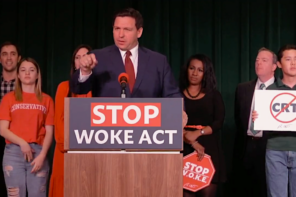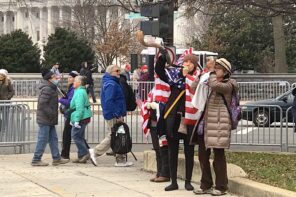In a March poll, respondents asked to choose whether the federal government’s priority should be “saving the economy” or “stopping the virus” overwhelmingly chose the latter, 71% to 21%. Though the results offer some good news about the priorities of the American people, at that point in the pandemic at least, the choice is a false one.
With well over 100,000 deaths as of publication, more than the number of service members killed in World War I, America is living through an apocalyptic moment. But it’s also an apocalypse in the literal sense of an unveiling or disclosure—an unmasking. The coronavirus has unmasked how our lives are marked by a profound mutual dependence that challenges our self-understanding and political ideologies. It has unmasked a federal government captured by capitalist interests that mobilizes white nationalist populism as its foot soldiers to reopen the economy.
Our ugly history of social Darwinism is perhaps best exemplified—or revealed—by the Tennessee protester who famously brandished a sign reading, “Sacrifice the weak, Re-open TN.” The now former chairperson of the planning commission in Antioch, California suggested letting the virus run its course to kill the weak, elderly and homeless in order to relieve health care and Social Security costs. These perspectives are not outliers. We’re in the grasp of the politics of death over whose lives can be sacrificed (just as Black Lives Matter protesters across the nation). It did not and does not have to be this way. There’s still time to choose solidarity over sacrifice.
Our national conversation has been diminished by a false choice between saving lives and saving the economy. The road to this moral and spiritual cul-de-sac began with Trump’s declaration that the “cure cannot be worse than the disease.” Texas Lieutenant Governor Dan Patrick and conservative radio host Glenn Beck quickly rallied behind the idea and boldly claimed that, as older Americans, they were willing to sacrifice their lives instead of the country. The moral outrage was swift and it seemed as if the idea would only last a news cycle.
But then mainstream voices picked up this moral frame as if it were inevitable. Brilliant, topflight economists, as reported by FiveThirtyEight and Marketplace, asked “What is a human life worth?” Acting as modern day sages they assured anxious readers that yes, many corporations, institutions, and government regulators engage in a cost-benefit analysis and arrive at the value of a “statistical life.” In the midst of a pandemic, when many people are hungry for leadership and willing to “listen to the data” and “be guided by science,” the appeal is understandable. It’s also mistaken.
To be fair, economists are not placing a value on individual lives. They’re asking a different question: how much would people choose to pay to reduce their risk of dying? And there’s the problem. No one chooses to be in this pandemic. Essential workers weren’t given the choice to assess the risks of not having proper protective equipment. The over 40 million people who’ve filed for unemployment since the pandemic began constitute an economic crisis that wasn’t inevitable.
This was a political choice. Other nations have chosen to subsidize companies to preserve as many jobs as possible. M.T.A. conductor Sujatha Gidla’s gut-wrenching testimony “We Are Not Essential. We Are Sacrificial” describes admonishing passengers every 15 minutes to wash their hands while not having access to soap and water themselves. Amanda Null’s exemplary reporting on “Georgia’s Experiment in Human Sacrifice” documents that state’s efforts to force its residents to choose between the risk of death at work or financial destitution at home.
***
As a nation our politics is imposing sacrifices and withholding solidarity.
And some communities are experiencing this in a particularly painful way. The coronavirus has unmasked the legacy of structural racism that produces profound health disparities. With grim and heartbreaking regularity, the coronavirus exploits these disparities exposing Black and Latinx communities to a disproportionate amount of death, grief and suffering. So much so that the Allegheny County Council has taken the courageous step to declare racism a public health crisis.
However, it’s clear these facts are not relevant to the political forces pushing to “reopen the economy.” In the politics of death, such forces are all too willing to sacrifice the loved ones of Black and brown essential workers keeping our nation afloat. To make matters worse, the co-conspirators of capital interests and conservative populism are aided by spurious medical science. The result is a dangerous self-deception from which their own lives and loved ones are not immune. Not even our children.
Dr. Mehmet Oz, a health advisor to the Trump administration, argued that schools are an “appetizing” opportunity to reopen the economy, and that this could be done with only a “2-3% mortality rate.” While an argument raged as to what exactly Oz meant by a 2-3% mortality rate, what is clear is that his comments are still bound by the logic of sacrifice and not solidarity. Intentional or not, proposals that do not prioritize vulnerable populations, and engage in sector-based plans for recovery, mass testing, contact tracing and social distancing, are tantamount to social and ethnic cleansing. Some will cringe at such language. However, when Las Vegas Mayor Carolyn Goodman offers up her city as a “control group” for experimentation, it’s a sober description of where we are.
And we’re not here due to a lack of resources or expertise. The “Roadmap to Pandemic Resilience,” published by Harvard University’s Edmond J. Safra Center for Ethics, is a solid plan for recovering the economy in phases while flattening the curve and protecting civil liberties. However, even the best laid plans require political will. Such political will requires a profound social solidarity with the most vulnerable populations.
Even as the crisis in our nursing homes continues, criminal justice advocates have been urgently calling attention to the crisis in our jails and prisons. It’s no secret that America incarcerates the largest share of its population than any country in the world. The rampant racial disparities in the criminal justice system and the use of incarceration to address poverty and other social problems is well documented. And our use of correctional facilities as primary mental healthcare providers is a scandal.
However, the coronavirus won’t wait for piecemeal efforts to reform these injustices. In particular, jails are notorious for incubating and spreading infectious diseases. This virus won’t confine itself to our preconceived ideas about people who reside in our jails. It will affect both detainees and staff as well as their families and communities. While many facilities are reducing their population, our efforts are still not enough. We may well fail at flattening the curve without massive decarceration. This requires recognizing the patterns of shared social life that make our individual lives and pursuits possible. Such recognition moves us from the spirit of sacrifice to solidarity. And it is not easy.
***
In A Testament of Hope, Dr. Martin Luther King, Jr. reminds us that “We are caught in an inescapable network of mutuality, tied in a single garment of destiny” and that we must “learn to live together or perish as fools.” King was right, although sometimes I wish he were wrong. It would be easier to stomach those pushing to reopen the economy if the only lives they’d be sacrificing were their own.
And there’s another uncomfortable truth lurking behind King’s counsel. If America continues to choose sacrifice instead of solidarity, we won’t simply perish. That’s too romantic. The more likely scenario is that unprecedented levels of suffering and desperation will lead to social predation and political violence. The rhetoric and politics of sacrifice distorts the paths we can choose and the consequences of our choices. We underestimate to our peril the vulnerability and fragility of the social fabric King so eloquently described. And the urgency of solidarity has only become a more urgent and poignant demand as so many Americans have been shocked by the deaths of Ahmaud Arbery, Brianna Taylor, Tony McDade and George Floyd at the hands of police.
Choosing solidarity means breaking America’s racial contract.
The racial contract is an idea developed by philosopher Charles Mills. The analogy of society as a contract between people regarding the principles and rules to be governed by has a long history. It’s often invoked to both explain and critique injustice and inequality. This idea helps us to see that the social contract is actually a racial contract upholding white supremacy as a global political system. This contract establishes the moral and political superiority of whites over nonwhites. It is this racial contract that sacrifices the equality, freedoms and often the very lives of Black people and others who are nonwhite. The police are the enforcers and representatives of the racial contract. Trevor Noah, comedian and host of The Daily Show has breathed new life into this idea.
The racial contract allows Noah to connect Amy Cooper calling the police on birdwatcher Christian Cooper and reactions to the uprisings in the wake of George Floyd’s murder. Amy Cooper demonstrates a clear-eyed awareness about how police will respond to a white woman being threatened by a Black man. In fact, Cooper’s actions are part of a well-known and documented pattern of racial hoaxes, which often consist of white people falsely claiming they were harmed by (most often) a Black male. The racial contract presumes Amy’s innocence and ensures her safety while assuming Christian’s guilt and possibly leading to his death.
Noah deftly uses the racial contract to critique the anger directed at the social unrest in the wake of George Floyd’s murder. He suggests that this anger is rooted in what they see as people “destroying the contract that you thought they had signed with your society. Now imagine if you were them watching that contract being ripped up every single day.” This invitation to imagination reveals that the racial contract produces its own particular form of misunderstanding and ignorance. As such, the beneficiaries of the racial contract do not understand their participation in supporting a racist society.
And there’s another aspect to this racial contract that I want to add. The social unrest that put the nation on edge represents the rider to the racial contract.
Historically, American cities do not burn as the direct result of profound disparities in education, housing, health, unemployment, incarceration, or a myriad of other racial injustices. Rather, the indignity of experiencing violence or death by those sworn to protect us is often a breaking point. In his testimony before the House Judiciary Committee Hearing on Police Reform, law professor Paul Butler states, “the flames that engulfed Watts in 1965, Newark in 1967, Miami in 1980, Los Angeles in 1992, Ferguson in 2015 and Minneapolis in 2020 were in response to police violence against Blacks.” These forms of unrest reveal the persistence of the racial contract as well as challenges to its legitimacy—even in the midst of a pandemic.
Black feminist and abolitionist Ruth Wilson Gilmore’s definition of racism as the “state-sanctioned or extra-legal production and exploitation of group-differentiated vulnerability to premature death” reveals the link between police violence and the novel coronavirus. The social conditions that occasion racial disparities in COVID-19 deaths and the exploitation of essential workers are protected by policing in America. George Floyd survived the coronavirus, but couldn’t survive the racial contract that devalued his life. Economists value human life at $10 million. Philonise Floyd, the brother of George Floyd asked if his life was worth $20.
Twenty dollars.
This is why many doctors are supporting the protests. Despite the risks, they understand this as a public health intervention addressing the root causes of racial inequality. And there’s also an important difference between these protests and those in previous eras. They are decidedly multi-racial. The demand to defund the police and reinvest in social goods that address social problems while redefining safety strikes at the heart of the racial contract that citizens in Minneapolis and across the nation are attempting to abolish. They’re opting for relationships based upon solidarity not sacrifice.





